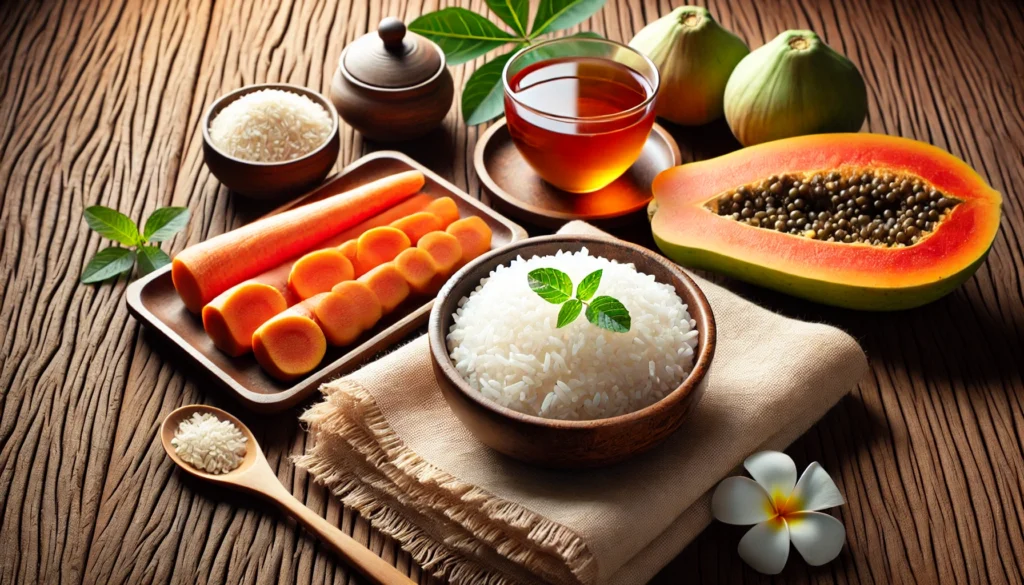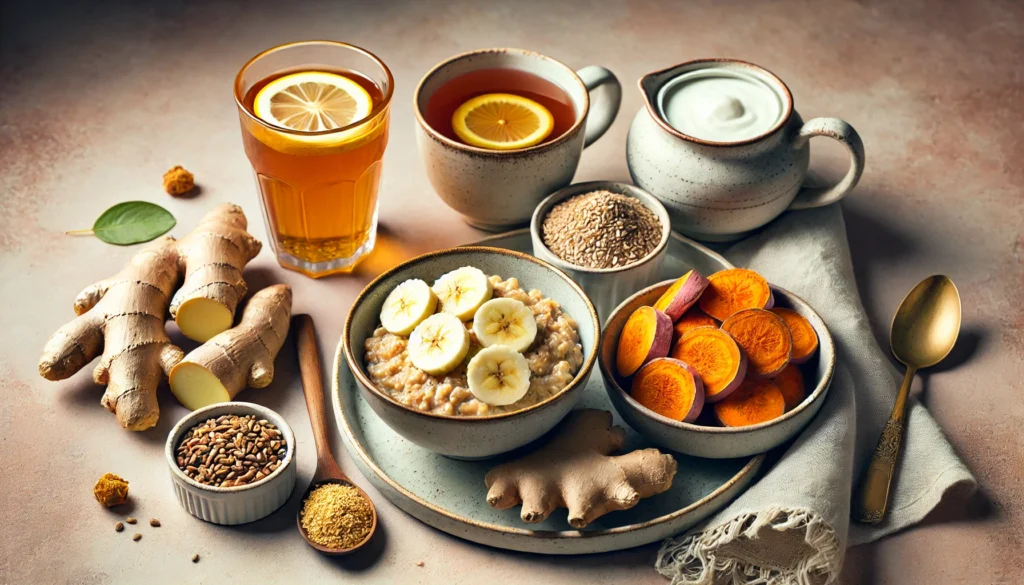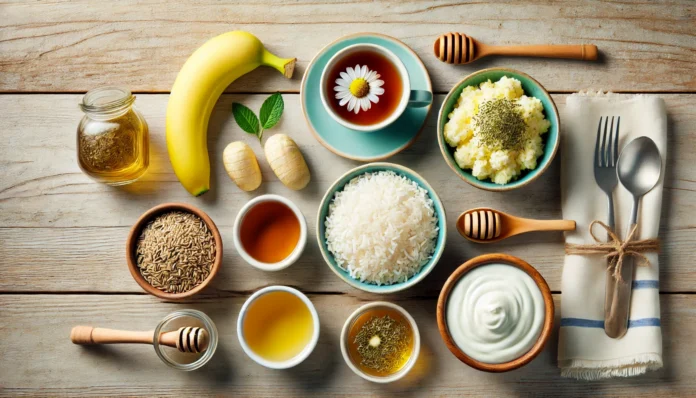The stomach is one of the most sensitive organs in the body, often reacting to stress, dietary choices, and environmental factors. Stomach pain, bloating, and discomfort can arise due to indigestion, stress, or other underlying health issues. Whether caused by anxiety or a temporary digestive disturbance, knowing what to eat when the stomach is upset from stress can make a significant difference in providing relief. By choosing the right foods, you can soothe an uneasy stomach, promote better digestion, and restore overall gut health.
You may also like: How to Improve Gut Health Naturally: Science-Backed Tips for a Stronger Microbiome
Understanding the Connection Between Stress and Stomach Pain
Stress has a profound effect on digestive health. The gut and brain are closely connected through the gut-brain axis, meaning that emotional distress can manifest as physical symptoms, including abdominal pain, bloating, and indigestion. When stressed, the body releases hormones such as cortisol and adrenaline, which can disrupt digestion and lead to stomach cramps and nausea. Understanding how stress impacts digestion is essential in selecting good food for stomach upset, as the right diet can counteract these effects and restore balance.
Diet plays a crucial role in managing stress-related digestive issues. Consuming the best food for stomach pain can help regulate digestion and ease discomfort. Foods rich in fiber, probiotics, and anti-inflammatory compounds support gut health, while highly processed and greasy foods can exacerbate symptoms. By being mindful of dietary choices, individuals can reduce the occurrence of stress-induced stomach pain and discomfort.

The Role of Food in Alleviating Stomach Discomfort
Certain foods are known for their ability to calm an uneasy stomach and provide relief from discomfort. Understanding the properties of these foods and incorporating them into your diet can be highly beneficial for overall digestive health. The best foods for stomach pain are those that are gentle on the digestive system, easy to digest, and packed with nutrients that promote gut health.
Ginger, for example, has been used for centuries to treat nausea and digestive distress. It contains bioactive compounds such as gingerol, which has anti-inflammatory and antioxidant properties that can soothe an upset stomach. Similarly, bananas are excellent for digestive health due to their high fiber content and natural antacid properties. They help absorb excess stomach acid, reducing symptoms of heartburn and bloating.
Best Foods for Stomach Pain and Digestive Discomfort
When experiencing stomach pain or digestive discomfort, choosing the right foods can significantly improve symptoms. The following foods are among the best for easing abdominal pain and promoting digestive health:
1. Ginger
Ginger is widely recognized for its ability to reduce nausea, bloating, and inflammation. Whether consumed as a tea, in meals, or as a supplement, ginger helps stimulate digestion and relieve stomach pain. Drinking warm ginger tea can soothe an uneasy stomach and provide quick relief from digestive discomfort.
2. Bananas
Bananas are gentle on the stomach and provide essential nutrients such as potassium and magnesium. They contain pectin, a type of fiber that aids digestion and helps regulate bowel movements. Bananas also act as a natural antacid, making them a good food for stomach pain and acid reflux.
3. Oatmeal
Oatmeal is an excellent source of soluble fiber, which supports digestive health by absorbing excess stomach acid and promoting smooth digestion. It is easy to digest and provides sustained energy, making it a suitable choice for those experiencing stomach upset from stress.
4. Chamomile Tea
Chamomile tea is known for its calming properties, both for the mind and the digestive system. It contains antioxidants that reduce inflammation in the gut and help alleviate stomach cramps and nausea. Drinking chamomile tea before meals can aid digestion and prevent discomfort.
5. Yogurt with Probiotics
Yogurt contains probiotics, which are beneficial bacteria that support gut health and balance the microbiome. Consuming probiotic-rich foods can help regulate digestion, reduce bloating, and prevent stomach pain caused by an imbalance in gut bacteria.
6. Rice and Plain Crackers
Bland foods such as rice and plain crackers are easy on the stomach and help absorb excess stomach acid. These foods are part of the BRAT (Bananas, Rice, Applesauce, Toast) diet, which is often recommended for individuals experiencing stomach upset.
7. Peppermint
Peppermint has natural antispasmodic properties that relax the muscles of the gastrointestinal tract, reducing cramps and bloating. Peppermint tea or oil can be effective in calming an uneasy stomach and alleviating digestive discomfort.
8. Applesauce
Applesauce is easy to digest and provides pectin, which helps firm stools and regulate digestion. It is a good food for stomach upset, particularly for individuals experiencing diarrhea or loose stools.
Foods to Avoid When Experiencing Stomach Pain
While certain foods can help alleviate stomach pain, others can worsen symptoms and prolong discomfort. Avoiding highly acidic, spicy, and greasy foods is crucial when dealing with an upset stomach. Carbonated beverages, dairy (for those who are lactose intolerant), and artificial sweeteners can also trigger digestive distress.
Fried foods, processed snacks, and heavy meals place extra strain on digestion, making symptoms more severe. Alcohol and caffeine can further irritate the stomach lining, leading to increased acidity and discomfort. By eliminating these triggers, individuals can promote a healthier digestive environment and reduce the likelihood of stomach pain.

Frequently Asked Questions (FAQ) on Best Foods for Stomach Pain and Stress-Related Upset
1. How does stress impact digestion, and what can be done to reduce its effects?
Stress triggers the release of hormones like cortisol and adrenaline, which can slow digestion, increase stomach acid production, and lead to cramping, bloating, and discomfort. Chronic stress may even contribute to conditions such as irritable bowel syndrome (IBS) and acid reflux. To counteract these effects, consuming good food for stomach pain, such as bananas, yogurt, and oatmeal, can help regulate digestion and provide a soothing effect. Practicing mindful eating, engaging in relaxation techniques such as deep breathing or meditation, and maintaining a regular eating schedule can also reduce stress-related digestive issues. In addition, staying hydrated and incorporating gentle physical activity, such as yoga or walking, can promote better digestion and overall gut health.
2. What is the best food for stomach pain caused by indigestion?
Indigestion often results from overeating, consuming too many fatty or spicy foods, or eating too quickly. Choosing the best food for stomach pain in such cases involves selecting foods that are easy to digest and help regulate gastric acid levels. Ginger is highly effective in aiding digestion and reducing bloating, while papaya contains enzymes that break down proteins, making it easier for the stomach to process meals. Additionally, plain rice and toast can help absorb excess acid and provide relief. Avoiding heavy, greasy, or highly processed foods is crucial in preventing further irritation. Drinking warm herbal teas like chamomile or peppermint can also ease indigestion and soothe an upset stomach.
3. What are some good things for stomach health that support long-term digestive wellness?
Long-term digestive wellness depends on a combination of a balanced diet, adequate hydration, and proper meal timing. Consuming fiber-rich foods such as whole grains, fruits, and vegetables helps regulate bowel movements and prevent constipation. Fermented foods like kefir, miso, and kimchi introduce beneficial probiotics, which maintain a healthy gut microbiome. Including anti-inflammatory foods such as turmeric, ginger, and green leafy vegetables can help reduce gut irritation and support smooth digestion. Drinking enough water is essential to keep the digestive system functioning properly and prevent issues such as bloating and acid reflux. Lastly, eating smaller, more frequent meals rather than large, heavy ones can improve digestion and prevent stomach discomfort.
4. What are the best foods for stomach cramps caused by bloating?
Stomach cramps due to bloating can be relieved by consuming foods that help expel gas and reduce inflammation. Peppermint tea has natural antispasmodic properties that relax the muscles in the digestive tract, while fennel seeds help relieve gas and bloating. Cucumbers, due to their high water content, can help flush excess sodium from the body, reducing bloating. Pineapple contains bromelain, an enzyme that aids digestion and prevents bloating after meals. To avoid exacerbating bloating, limit foods that are high in artificial sweeteners, carbonated beverages, and excessive salt, as they can trap gas in the digestive system and increase discomfort.
5. What should you eat when your stomach is upset from stress?
When stress affects digestion, it’s essential to eat foods that are gentle on the stomach and promote a calming effect. Oatmeal provides a slow-release energy source that stabilizes blood sugar and helps ease stress-induced nausea. Warm, brothy soups, especially those made with bone broth, provide essential minerals that support gut health and hydration. Almonds and other magnesium-rich foods can help relax the nervous system, reducing tension in the gut. Herbal teas like chamomile or lemon balm have a soothing effect on both the digestive tract and the mind. Eating smaller, balanced meals at regular intervals can prevent stress-induced acid reflux and digestive discomfort.
6. What are the best foods for an uneasy stomach after eating something heavy or greasy?
After consuming a heavy or greasy meal, choosing the right foods can help restore digestive balance. Green tea contains polyphenols that aid fat digestion and reduce the burden on the stomach. Eating plain yogurt with probiotics can help rebalance gut bacteria and reduce bloating caused by high-fat foods. Apples are rich in pectin, which helps absorb excess fats and ease digestion. Cucumber and celery are high in water content and act as natural diuretics, flushing out excess sodium and preventing water retention. Avoiding further fatty foods and drinking warm lemon water can help break down oils and promote stomach comfort.
7. What foods are good for abdominal pain caused by acid reflux?
Acid reflux occurs when stomach acid flows back into the esophagus, causing burning pain and discomfort. The best food for stomach pain caused by reflux includes alkaline foods that neutralize acidity. Bananas, melons, and oatmeal are excellent choices as they help absorb excess stomach acid. Ginger reduces inflammation and soothes the esophagus, while non-citrus herbal teas, such as chamomile and licorice root, can coat the stomach lining and provide relief. Consuming lean proteins like grilled chicken or fish instead of fried options prevents acid buildup. Avoiding citrus fruits, caffeine, and spicy foods is essential to prevent acid reflux from worsening.
8. How can you calm an uneasy stomach after consuming dairy products?
For individuals with lactose intolerance or dairy sensitivity, consuming dairy can lead to bloating, cramps, and diarrhea. The best way to calm an uneasy stomach in such cases is to consume lactose-free or plant-based alternatives such as almond or coconut milk. Ginger tea can help settle the stomach and reduce nausea, while papaya contains digestive enzymes that aid in breaking down dairy proteins. Eating plain rice or toast can absorb excess stomach acid and provide relief from discomfort. Probiotic supplements or fermented foods such as sauerkraut and kimchi can help restore gut balance if dairy has disrupted digestion.
9. What are some good foods for stomach pain that can also support gut healing?
For individuals experiencing frequent stomach pain, focusing on gut-healing foods can promote long-term digestive health. Bone broth contains collagen and amino acids that support gut lining repair and reduce inflammation. Aloe vera juice has soothing properties that help coat the stomach and prevent irritation. Fermented foods such as kefir, kimchi, and miso introduce beneficial probiotics that balance gut bacteria. Sweet potatoes, rich in fiber and beta-carotene, support healthy digestion and reduce gut inflammation. Limiting processed foods and artificial additives while increasing whole, nutrient-dense foods is key to maintaining a pain-free stomach.
10. How can hydration play a role in preventing stomach discomfort and promoting digestion?
Proper hydration is crucial for maintaining digestive health and preventing stomach pain. Drinking water aids in the breakdown of food and the absorption of nutrients, reducing the likelihood of indigestion and constipation. Coconut water provides natural electrolytes that prevent dehydration-related bloating and cramping. Herbal teas such as peppermint and chamomile hydrate the body while also soothing the digestive system. Eating hydrating foods like watermelon, cucumbers, and celery can supplement fluid intake and reduce the risk of stomach discomfort. Avoiding excessive caffeine and alcohol, which can dehydrate the body and lead to acid reflux, is essential in maintaining optimal digestive health.

Conclusion: Nourishing the Gut for Long-Term Relief
Managing stomach pain and stress-related digestive upset requires a combination of dietary adjustments, stress management, and lifestyle changes. Choosing the best food for stomach pain, such as ginger, bananas, and yogurt, supports gut health and alleviates discomfort. At the same time, avoiding triggers like fried foods and caffeine can prevent symptoms from worsening. By making mindful choices and incorporating good food for stomach pain into daily meals, individuals can promote long-term digestive well-being and reduce the impact of stress on the stomach.
stomach soothing foods, natural remedies for digestion, foods to ease bloating, anti-inflammatory diet for gut health, best meals for sensitive stomachs, stress and digestion connection, gut-friendly meal ideas, herbal teas for digestion, probiotic-rich foods, hydration for digestive health, fiber-rich diet for digestion, digestive system support, stomach-friendly diet, natural ways to relieve indigestion, holistic gut health tips, foods that help acid reflux, gentle diet for upset stomach, best herbs for digestion, nutrition for gut healing, calming foods for digestive discomfort
Further Reading:
What To Eat (and Avoid) When You Have an Upset Stomach
What to Eat (or Not) When Your Stomach Hurts
What To Eat (And Avoid) When Your Stomach Is Upset
Disclaimer
The information contained in this article is provided for general informational purposes only and is not intended to serve as medical, legal, or professional advice. While Health11News strives to present accurate, up-to-date, and reliable content, no warranty or guarantee, expressed or implied, is made regarding the completeness, accuracy, or adequacy of the information provided. Readers are strongly advised to seek the guidance of a qualified healthcare provider or other relevant professionals before acting on any information contained in this article. Health11News, its authors, editors, and contributors expressly disclaim any liability for any damages, losses, or consequences arising directly or indirectly from the use, interpretation, or reliance on any information presented herein. The views and opinions expressed in this article are those of the author(s) and do not necessarily reflect the official policies or positions of Health11News.


